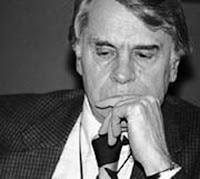[A version of this piece is cross-posted to Current]
How might one politically categorize the following statement?
[M]y apparently disparate-sounding worries....all result from one or another move on the part of the culture away from the immediate, the instinctual, the face-to-face. We are embodied beings, gradually adapted over millions of year to thrive on a certain scale, our metabolisms a delicate orchestration of innumerable biological and geophysical rhythms. The culture of modernity has thrust upon us, sometimes with traumatic abruptness, experiences, relationships, and powers for which we may not yet be ready–to which we may need more time to adapt....If we cannot slow down and grow cautiously, evenly, gradually into our new technological and political possibilities and responsibilities–even the potentially liberating ones–the last recognizably individual men and women may give place, before too many generations, to the simultaneously sub- and super-human civilization of the hive.
For those whose exposure to or engagement with political ideas is fairly minimal–whether by choice or by circumstance or both–the question would likely seem strange. After all, there are no obvious partisan markers anywhere in this statement, no references to presidential candidates or global events or policy disputes. So what is political about it? But for those who have some familiarity with the history of political ideas and arguments, as well as some of their attendant philosophical formulations and literary tropes, there are flags in this statement which suggest an answer–and that answer, in all likelihood, would be “conservative.”
Not “conservative” in the way most Americans would be likely to use the term today, to be sure. The passage doesn’t provide anything that connects to Donald Trump or lower taxes or tighter immigration or anti-LGBTQ positions or the Supreme Court, at least not directly. But astute readers would pick up on the final sentence’s reference to Friedrich Nietzsche’s “last man,” his vision of a humanity that has succumbed to nihilism, hedonism, and passivity, and thus falls into a kind of groupthink where all individual accomplishments are lost. The passage also speaks warningly about developments and innovations of modernity which humanity, whose embodiment reflects a deep evolutionary grounding in small-scale interactions, needs to be far more cautious about embracing. Hence, the politics of this passage could be–and, I think, would be, if read without any additional context–plausibly coded as small-c conservative, or at least as philosophically anti-progressive. Its implications include a preference for the local, a suspicion of intellectual abstractions, a discontent with the ennui that consumer wealth and technological ease has enabled, and a fear of a too-rapidly pursued future whose liberating possibilities will likely be lost unless they are approached incrementally (if at all). In short, it communicates a respect for, even a valuation of, a more limited conceptualization of our social world–and, aside from certain strains of environmental concern within the current constellation of liberal thought, talk of “limits” is generally seen as the provenance of conservatives, not progressives.

I think there is–though, as with all ideological labels, it’s a categorization with greater use as a conversational reference than as an analytical tool. The label is “left conservatism,” and applying it to Scialabba’s writings–or, perhaps more accurately, using Scilabba’s writings to apply the label more broadly–is an intellectual exercise worth engaging in, especially in our moment when so many other political categorizations seem either overthrown or irrelevant or both.

The most intellectual plausible articulation of this idea, I think, is to say that modernity–whether that is dated to the Protestant Reformation, the Declaration of Independence, the Industrial Revolution, or any other particular historical landmark or era–is simply different from what came before it. The 18th-century (and earlier) traditions and communities which Burke defended cannot exercise the authority they once did in a world in which individual subjectivity has conditioned our very understanding of the self. Technology, social fluidity, capitalism, democracy: all are genies let out of the bottle, in the face of which traditions of all kinds suffer. (Marx’s famous statement in The Communist Manifesto that, with industrialization, “all-fixed, fast-frozen relations, with their train of ancient and venerable prejudices and opinions are swept away....all that is solid melts into air, all that is holy is profaned,” is an obvious support to this formulation, but Scialabba himself adds one as well, describing Burke’s own writings as “expressions of outraged common sense” in the face of the inevitable—and, he asserts, entirely justified—transformations that came with the expansion of suffrage and other “democratic truths”). Hence, the preservation of Burkean values–acting “conservatively,” in other words--now requires actions which go beyond the expansion of liberal guarantees or the amelioration of socio-economic disruptions.
This reading of Mailer may simply sound like the conservative insight famously expressed by G.K. Chesterton in his book Orthodoxy: “If you leave a white post alone it will soon be a black post. If you particularly want it to be white you must be always painting it again; that is, you must be always having a revolution.” But the “revolution” invoked by Chesterton in the name of conserving a particular state of affairs was a formal, not structural one, whereas the better understanding of Mailer’s point about “think[ing] in the style of Marx,” I believe, means something truly “left”in the structural, even radical, sense. Maybe, the left conservative thinks, only a radical shift towards the democratization, the socialization, and the equalization of the products and processes of modernity will be sufficient to enable people to continue to thrive in their communities.
And it really is communities which are central here. (One could argue that “left conservatism” might better be expressed as “left communitarianism,” and there’s some value to putting it that way. But since the connections and commonalities which emerge in the context of communities are, I think, something that human beings, as political animals, always seek to construct and always mourn the absence of–and here I am heavily influenced by the writings of Michael Walzer and Charles Taylor, two political philosophers that were frequently labeled “communitarians” when that term enjoyed a boomlet 30 years ago–focusing on the concern to literally conserve that which is genuinely valuable about our communities is appropriate.) Our individualistic age puts an asterisk of suspicion beside all communities, however defined, seeing them all as potential sources of majoritarian abuse or undemocratic tyranny–which, of course, they too often are; as Christians at least ought to be quick to acknowledge, we are fallen beings, after all. But the conservative desire for belonging and rootedness and community, whatever evils it enables, also grounds both democratic and egalitarian possibilities: traditions are forms of meaning and fulfillment which cannot (or at least cannot easily) be turned into abstractions and thus be taxed away from you or turned against you by those who wield power. To the extent that the modern world sees profits, procreation, wars, borders, religions, holidays, families, markets, marriages, and more as institutions and events best understood, conducted, and transformed in light of some abstract principle--whether that be individual rights or personal conscience or democratic harmony or economic progress--one could argue, if one is of this particular conservative orientation (as I think Scialabba is, at least partly), that something in the modern world has gone wrong, or at least has gotten too far away from the instinctual truths and embedded necessities of human existence, truths and necessities which are the necessary (if not sufficient) prerequisites to treating all people as equally capable of self-rule and equally deserving of respect. That’s not necessarily a defense of all communities, especially not national ones, which too regularly employ the coercive power of the state to maintain the definition and borders which those in power decide upon; Mailer’s communitarianism, a term he probably would have blanched at, was decidedly small-scale and anarchic. But the centrality of being in connection with others, and defending those connections, remains.
Not many have picked up on this reading of Mailer’s ideas in the two generations since, to say the least. On the left or progressive liberal side of America’s intellectual divide, as it began to deepen and sharpen in the decades following the upheavals of the 1960s, leftism mostly focused its decreasing energies on various statist parties and platforms, while most liberals came to treat those who worried about the excesses of their individualistic liberatory language as either 1) accidental intellectual traitors (as it was frequently expressed at a UC-Santa Cruz conference on the “specter ofleft conservatism” in 1998, these unfortunate folk are genuine leftists whose distaste for the latest theoretical developments has tricked them into allying with conservative forces), or 2) just remnants of an old rural conservative Democrat faction, soon to die out. That’s assuming White voters were the ones being discussed, of course; the religiousity and social conservatism of many Black voters was treated very differently, though not until Bill Clinton was its preferred language given much credence, and even that didn’t last–Barak Obama, our first Black president, reflected very little of that sensibility while in the White House (which, cynically speaking, is perhaps one of the reasons he was able to attain it.)
As for America’s rightward flank, the rise of a pro-business, anti-socialist libertarianism as a component of the Republican coalition from the 1960s through the 1990s made any kind of liberal egalitarianism, much less leftism, unwelcome there. Occasionally you see attempts to import into American conservative discourse “Red Tory” formulations more common to Western European conservatism generally, but despite gestures in that direction (George W. Bush’s “compassionate conservatism,” for example), none of them have in any significant way shaped the overall conservative coalition in the U.S. Of course, some would insist upon adding a “until the rise of Donald Trump in 2016” to that sentence, and it is true that Trump’s profound lack of ideological (much less ethical) grounding has arguably presented an opening for leftist ideas to experience a revival in Republican circles. But while in today’s America you are, in fact, more likely to hear talk of structural or revolutionary changes to our liberal capitalist and democratic order coming from the Trumpist corner of the Republican party than from the Democrats led by Joe Biden, that talk is generally, and tragically, reflective of a fascist-adjacent authoritarianism which too many social conservatives, following Trump, seem to have become comfortable with. Even thoughtful and nominally worker-friendly treatments of the integralist argument in favor of more firmly supporting traditional community-based values seem to presume egalitarianism itself to be the real problem, and what limited appreciation for the solidarist approach to building economic equality–meaning unions, mainly–which still exists in America today is found coming the Democrats and the White House, not Mar-a-Lago.

All of which means that the left conservative position lacks a broad constituency in American politics. But that does not mean it lacks a voice. Perhaps most influentially, the historian Christopher Lasch, long a hero to many dissident and contrary conservatives (even as he remained personally a committed Democratic voter and a firm-if-worried supporter of the liberal egalitarian project overall through his life), and someone who himself never used terms like “left conservative” or “communitarian” in a self-descriptive way (even as close students of Lasch work subsequently used both), articulated at least the outlines of what could be called a left conservative ideology as well as anyone. And Scialabba presents, in multiple essays, Lasch as perhaps the most valuable of all the “antiprogressives” (which is not the same as “conservatives”) whom he holds that fans of the Enlightenment, like himself, must learn from.
That learning, he writes, involves grappling with the best thinkers’ “combination of discrimination and democratic passion,” defining the latter as “the constant remembrance that democracy entails not merely that the people should be governed well but also that the people should govern.” Mourning the tendency of intellectuals and politicians of all stripes–including both what he calls “the business party” and “the Progressives”–to ignore this fundamental principle, Scialabba’s cast of heroes includes, as he lays them out in his introduction to Only a Voice, scholars and activists and writers who, in one way or another, demonstrate a “moral intelligence” that “allowed them to make relevant distinctions and get the difficult decisions right.” This means, rather than simple apologists for the Enlightenment, such figures as Randolph Bourne, George Orwell, Irving Howe, Barbara Ehrenreich, Noam Chomsky, Ralph Nader, Richard Rorty, Bill McKibben, along with Lasch, earn his praise. These are people who, in his view, take seriously their “democratic obligation to persuade people before legislating for them”–and that means taking seriously the “anxieties about modernity” which confront all those whom these thinkers and writers, like Scialabba himself, attempt to clarify the democratic options for. The responses to this anxiety which these writers all wrestled with obviously vary greatly, from Rorty’s advocacy of setting aside worries about “self-creation” in the name of a bland yet vital “tolerance,” to Howe’s insistence that the ideal of socialism “will need to be reimagined in every generation,” to, perhaps most centrally, Lasch’s populist insistence the “the democratic character can only flourish in a society constructed to the human scale.” Yet Scialabba thoughtfully considers–and by so doing, makes it possible to learn from–them all.
That this practice of thoughtful learning includes giving sympathetic attention to what he calls “perhaps the most significant strain of social criticism in our time,” the “antimodernist radicalism” of limits one can find in writers like D.H. Lawrence, Lewis Mumford, Ivan Illich, Wendell Berry, or Lasch himself, is not entirely pleasing to even some of Scialabba’s most enthusiastic readers. In a review essay on Only a Voice in Commonweal, Sam Adler-Bell gently suggests that Scialabba misunderstands that modernity’s anxieties and doubts are less to be responded to than embraced as actually one of its strengths: the modern person “is not necessarily a conformist, a face in the crowd, incapable of independent thought,” but rather “is someone who detects these frailties in everyone else.” This is a subtle point, and a good one, but it also strikes me as an inverted application of Robert Frost’s famous comment that a liberal is someone too broad-minded to take their own side in an argument. Scialabba is far too conscientious a thinker to deny the immense accomplishment of Enlightenment liberalism in teaching people to be skeptical of the limits and presumptions they inherit or which have been imposed upon them. But he also recognizes, as anyone with even a smidgen of leftist suspicion of the bourgeoisie should, that such skepticism, without a foundation in practices and places and, yes, even prejudices–in the sense of “pre-judgments”–to draw upon, will often result not in robust, democracy-defending free-thinking, but rather in a literally care-less disconnection, a tendency to abstraction which capitalist overlords will be more than happy to use to manipulate and oppress. As Scialabba writes in “Progress and Prejudice,” the first and most overarching essay in Only a Voice, he has come to recognize “with some reluctance” that thinkers like Lasch are correct: that “as long as modernization is involuntary,” then conserving our ability to draw upon and stay within “our own skins—and even, perhaps, within traditional social forms” is needed, if our “every liberation” is not to be “captured and exploited.”
Left
conservatism is one way of articulating a set of political convictions that
can, at least as a matter of theory, see this needle, the needle which
modernity has presented us with, and thread it, thus enabling the continued
project of weaving together (or sewing up tears within) our democratic
political fabric. Scialabba, through his writing over the decades, like Lasch
himself in decades prior, has been an insightful advocate for the kind of
democratic learning which all of America’s diverse communities need–a learning
which reminds us of modernity’s liberating and equalizing accomplishments, and
what must be conserved if the left’s emancipatory project is to continue.
Whether this political categorization fits him well or not, his position is one
much worth contemplating–an action which would have to begin with reading his
most recent, and excellent, book.
